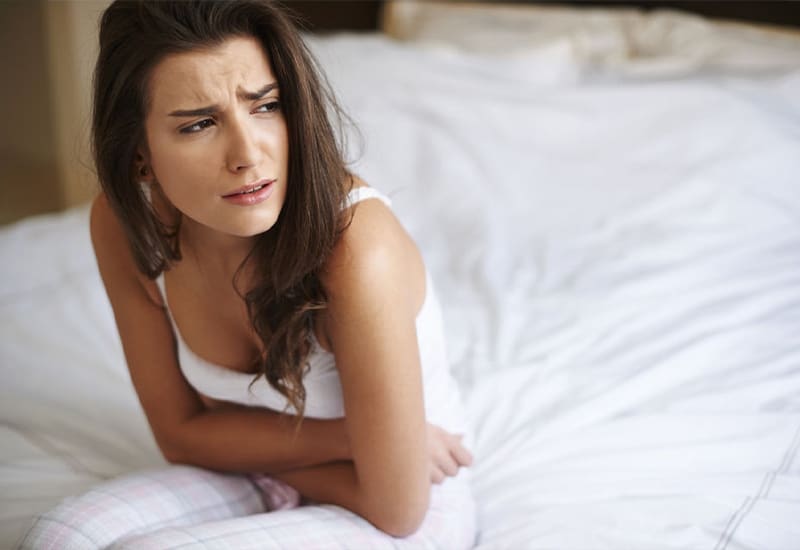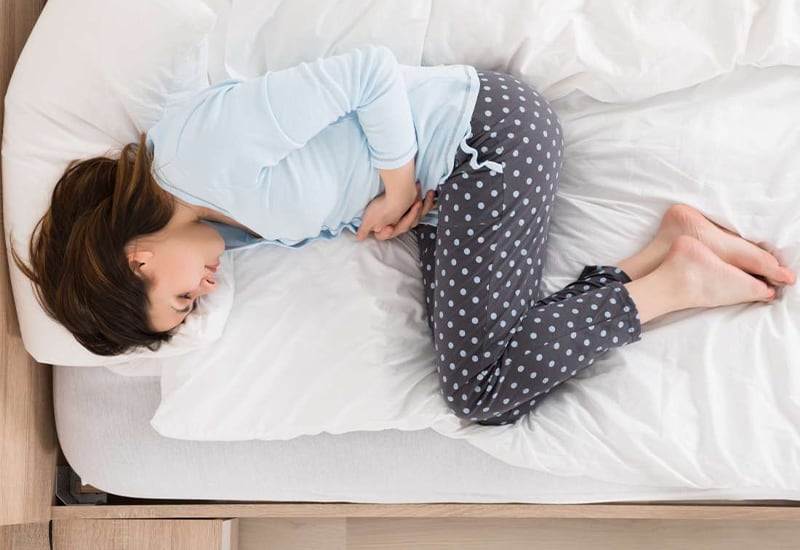Common PMS Symptoms And How To Deal With Them
Loretta Pride • Updated on June 21, 2023
Premenstrual syndrome (PMS) refers to the symptoms women have some time before they get their next period, usually a week or two before the next period begins. It is a general compilation of both emotional and physical symptoms affecting women usually after ovulation because, at this time of the month, the progesterone and estrogen levels start falling at a high rate if there is no chance of pregnancy. The premenstrual symptoms last until the first days of the menstrual period when the hormone levels begin to upsurge again.
It is not guaranteed for all women to get PMS symptoms; however, some women get their menstrual periods with very mild PMS symptoms and others without. Other women experience extreme PMS symptoms that it gets difficult to do everyday chores comfortably. At times, the PMS symptoms are so severe that they result in premenstrual dysphoric disorder (PMDD). The percentage of 5 women of childbearing age get PMDD. It is also common for women with high-stress levels, a family history of depression, and a personal history of postpartum depression to experience PMS.
The symptoms of PMS are different for every woman depending on the age and menstrual cycle, and they worsen as women approach their late 30s or 40s. After a woman hits menopause, the transition called perimenopause causes the symptoms to subside because there is no longer a period, meaning the hormone levels drop drastically.
Diagnosis of PMS
There is no definite way to diagnose PMS in women as there is no test to determine it. The doctor can take you through what happens during PMS and how much the symptoms will affect your mood and life to help you manage them better. The doctor uses the information given and attributes them to a particular symptom of PMS. You can tell that you are having PMS when you experience symptoms the first five days before your period starts for three consecutive months and end four days after your period begins. If you have trouble enjoying and doing normal activities, you could be having PMS. It is advisable for women to keep track of their PMS symptoms and their intensity using a phone app because the information helps the doctor understand your PMS better when you go for a check-up.

Symptoms of PMS
PMS symptoms are both physical and emotional for all women, and they change with age. These symptoms are different for every woman depending on the age and the family history of the specific woman.
The physical symptoms of PMS are inclusive of the following
Breast pain
Is a prevalent symptom of PMS in women characterized by swelling of the breasts and also breast tenderness. The signs are experienced during the second half of the woman’s menstrual cycle, and the severity ranges from mild to severe. This symptom is more critical to women in their childbearing years. The breast pain lessens during the period or right after the period as the progesterone levels begin to decrease.ausea; women experience some digestive discomfort some days before the start of their next period, which is a syndrome of PMS. Nausea and vomiting are signs that accompany the symptoms of PMS.
Cramping
Women experiencing PMS also have dysmenorrhoea, which is cramping occurring a day or two before the next period starts. The cramping lessens during the period, and it eventually stops by the end of the menstrual flow.
Other physical symptoms of PMS are such as constipation, diarrhea, bloating, head and backaches, clumsiness, and a low tolerance for light and noise.
Emotional or mental symptoms of PMS

Fatigue
It is common for women to experience fatigue some days before their periods start. This fatigue is attributed to PMS, which also brings about sleeping troubles. The fatigue goes away when the next period starts, and it can be solved by exercising to improve sleep patterns.
Mood changes
During PMS, women experience mood changes that affect the way they relate with other people. These changes come in the form of mood swings, depression, feelings of sadness, and frequent crying spells, and also having irritability and hostile behavior.
Appetite changes or food cravings and aversions
It is common for women to experience food cravings and aversions during PMS. They have a change in eating habits, and they start having cravings of chocolate, sugars, carbohydrates, or salty foods. Some women, however, experience a very ravenous appetite during PMS.
Tension or anxiety
Women experience stress and anxiety during PMS, which can affect their sleeping patterns and general mood for the day. It can cause them to sleep more or sleep less depending on the severity of the symptoms. The tension and anxiety can cause some women to have less interest in sex.

How PMS affects other health problems
Most women who experience PMS usually have a pre-existing health problem. The other issue may worsen during the menstrual cycle and fade as the period ends. Some of the health problems associated with PMS are inclusive of the following;
Irritable bowel syndrome (IBS)
This is a condition that causes bloating, gas, and cramping in women. The IBS signs can worsen some days before the next period starts.
Depression and anxiety disorders
These disorders are the most common conditions which are associated with PMS. The depression and anxiety symptoms worsen before or during the period and get better as the period approaches the end.
Bladder pain syndrome
Women who have this condition, are more likely to be affected by PMS syndromes. The cramping of women with bladder pain syndrome is more severe than for those without.
Other health problems that are worsened by PMS are asthma, migraines, and allergies.
Relieving PMS symptoms

To reduce the symptoms associated with PMS, the following tips are helpful.
Exercising and physical activity
Exercises help with symptoms such as depression, fatigue, and concentration difficulties. It is advisable to do regular aerobic activity throughout the month to help when the PMS symptoms kick in.
Getting enough sleep
Also helps in the management of PMS Symptoms as it helps the body to relax. Lack of sleep causes depression and anxiety, which worsens the severity of PMS.
It is advisable to choose healthy ways to cope with stress to lessen the PMS severity by talking to friends, doing yoga, massage, and meditation.
